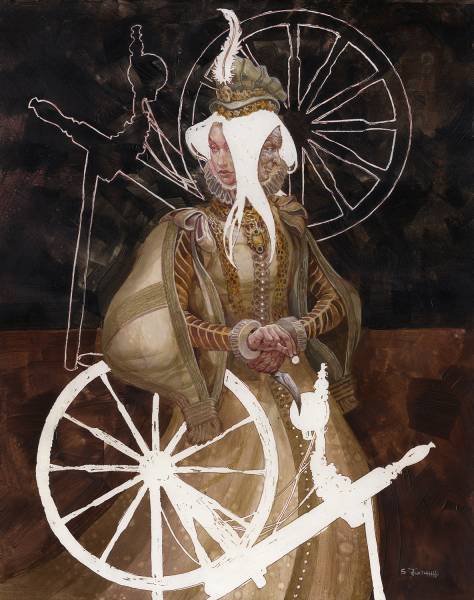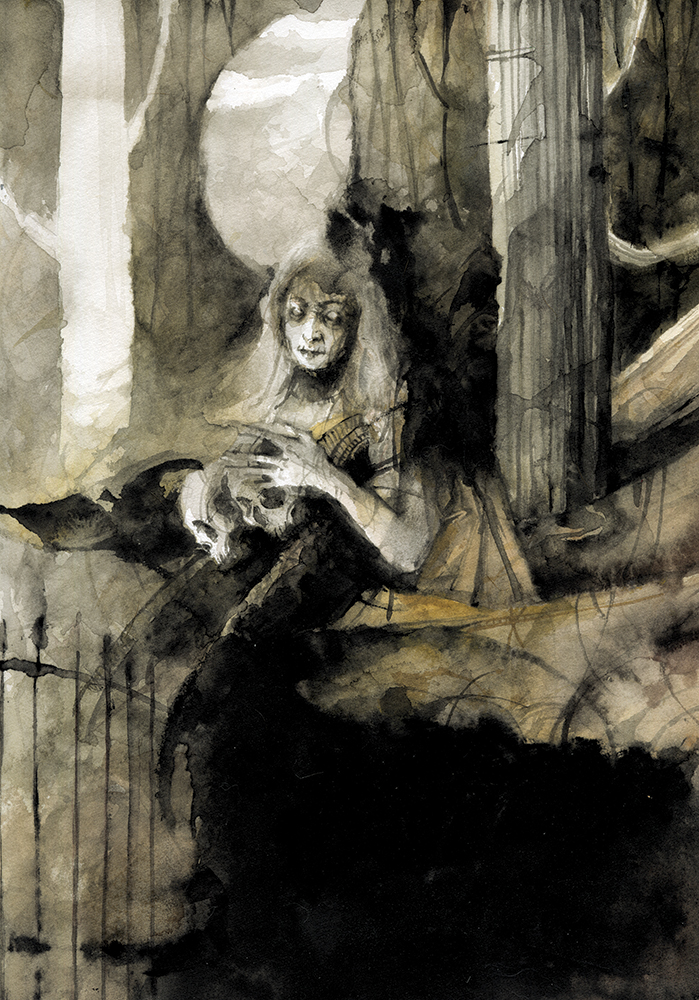[CW: disembowelment]
This week’s theme is folklore of the cold, snow, and ice. I was thinking about The Snow Queen because it’s literally right there but I was forbidden this topic by my best friend. Therefore, I’ll be covering someone who has a wild reputation and, as with many goddesses, can go either way, depending on how she feels about you. Y’all, I present to you Perchta, an Alpine goddess who might just ruin your Yule festivities if you piss her off.

Like other gods and goddesses, Perchta’s name has multiple meanings attributed to it. While her name might mean “bright one,” it also could mean “hidden” or “covered.” Those seem like contradictory meanings but etymology isn’t an exact science and meanings can change over time and within dialects. And too, many goddess and gods are known for having dual natures, and Perchta is no different. Having said that, her closest association is with the feast of the Epiphany, also know as Berchtentag.
Perchta hailed from the Upper German and Austrian regions of the Alps. Jacob Grimm believed that the she was the “cousin” or equivalent of Holda, who we will actually be be discussing in three weeks on #FairytaleTuesday. Both had the habit of appearing during the 12 Days of Christmas and both had an affinity for spinning. Having said that, I’ll get more into the Berchta side of her nature in that post.
As I mentioned, Perchta has more than one face that she she shows the world. she may come to you in the guise of a beautiful, shining snowy, goddess or she may appear as a withered old crone in tattered garments. Interestingly, she is often said to have a goose or swan foot. Grimm believed that this represented her ability to shapeshift and mention of this foot crops up in her stories in several different languages. This foot could be representative of her nature as a swan maiden or it could be related to the splayed foot that was often developed from working the treadle on a spindle.

Much like Santa Claus, Perchta was believed to visit houses between Christmas and Epiphany in search of who had been good or bad. If you had been a good child–worked hard and behaved yourself–you might find a silver coin in your shoe. If you hadn’t, well… you might get coal but only after she slit your belly open, pulled out your intestines, and filled the empty cavity with straw and rocks. This could also happen to girls who had not done the proper amount of spinning throughout the year or anyone who ate anything on the night of her feast other than fish and gruel.
The ladies of the house had to make sure that they had their spinning wrapped up by Twelfth Night and be ready to start their weaving. If not, they might find Perchta trashing their looms and burning their fiber. She also gets very angry if your house is messy and you didn’t leave out a bowl of gruel for her. This will lead to a slit belly filled with rocks.

Interestingly, Perchta is also associated, in some places, with the Wild Hunt. It is said that she flies trough the night, accompanied by an army of lost souls, some of which are known as the perchten, as well as a the souls of unbaptized children. These are known as “knocking nights” and they bring down great wind and thunder in the mountains as Perchta leads the hunt. According to another source, however, these stories that make Perchta into a monster who leads other monsters and slits open the bellies of children are a direct results of rising Christian sentiment in Europe. Catholic priests knew that they were up against it when it came to turning the people away from paganism, and for good reason, given that Christianity wasn’t nearly as exciting and lore-filled as paganism. So they did with Perchta what has been done to so many others and twisted her. This didn’t stop the people though, so the Church finally outlawed her worship in 1468.

This one is short today but, as I said, we’ll get more into Perchta’s story in a few weeks when I cover Holda. I know that I didn’t give Perchta the full amount of respect that I should have in this post but given that this is a day of feasting and family in America, I simply don’t have the time. I would like to think, though, that Perchta would appreciate my efforts to maintain home and hearth, even if my spinning isn’t what it should be.
Whether you do or don’t take part in Thanksgiving events, I hope that you have a lovely day!

3 thoughts on “#FolkloreThursday: Perchta”